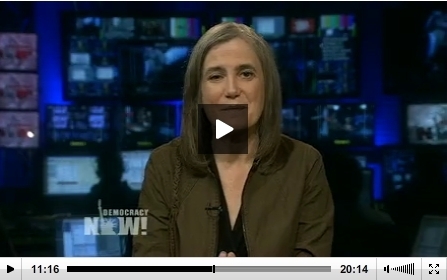Ozzie Zehner's Blog, page 5
November 4, 2011
GM Raises its Middle Finger to Bicycling [Updated]
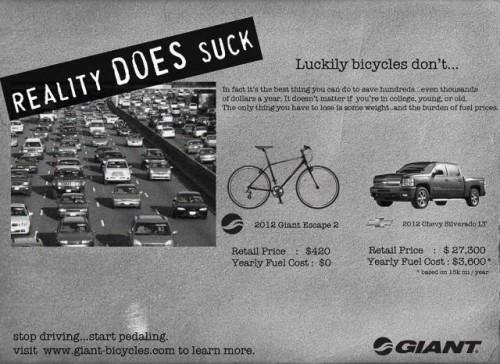
The bicycle manufacturer Giant created this parody of a General Motors advertisement after the car company mocked bicycling in a recent ad campaign
General Motors announced it is killing its "Reality Sucks" campaign due to public disapprobation. It's too late to pull ads and posters that have already run. It's also too late, apparently, to avoid the backlash parodies. The bicycle manufacturer Giant released it's own "Reality Does Suck" campaign (shown above) in response.
GM's Tom Henderson, Manager of Cross Brand Communications and Media Relations, was asked in a recent interview if GM might consider making bicycles someday. "I don't know if we're going to go there," replied Henderson, "but we are looking at other modes of transportation because not everybody wants to get around in a vehicle and not everyone needs to own a car."
(end of update – original blog post follows)
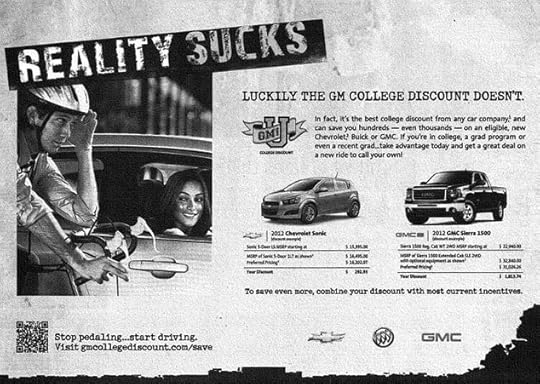
Image of the killed ad (courtesy of BikePortland.org)
As if being forced to bail out General Motors was not enough of a slap in the face to walkers and bikers, the company is now flipping them off.
A 2012 GM marketing campaign attempts to stigmatize those atop two wheels. The company's "reality sucks" campaign portrays an embarrassed college kid pulling up by bike next to an attractive model who's being chauffeured by car. The byline reads, "Stop pedaling…start driving." Besides being sexist and classist (but not, apparently, racist), according to critics, the ad's greatest offense may actually be far less divisive.
It's unrealistic.
Leave it to GM to be out of touch with their market. As anyone outside the Detroit void would know, you're far more likely to find students boycotting car culture than scoffing at bicyclists on today's college campuses. Nevertheless there remains a hitch.
Many students aren't able to walk or bike to class even if they want to do so. Sprawling suburban campuses, inadequate infrastructure, and unsafe conditions force many students to arrive to those boycotts by car. And we might think that this situation, in itself, is no particular fault of General Motors…if we knew nothing of history.
The General has long carried the hands of policymakers in its pockets and has always obliged when asked to help out with the nation's transportation policy matters. Even today, from Michigan's car-friendly conservative governor to Michigan's car-friendly liberal senator, it's presence emanates local and national politics. What's good for country is good for the General, and vice versa. Especially if that goodness is measured in billions.
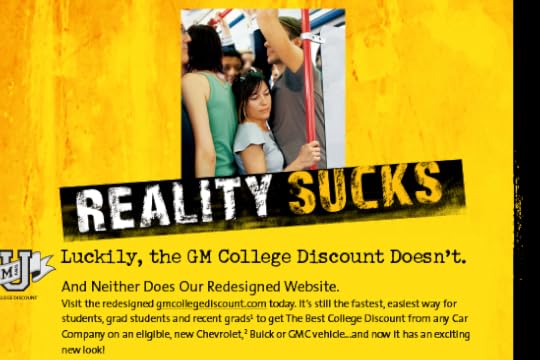
In this ad from a few years ago, public transit was the target of General Motors' advertising agency
Obama is already praising the bailout as a success. But by what measure? Is it a success because it has delayed the inevitable? Is it a success for sidestepping alternate plans that might have addressed bicycle infrastructure, walkability, or public transit?
Measuring any bailout as a success, as we are now painfully learning, is not simply a measurement of success itself, but a measurement of the yardstick being used. And in the end, whether it's a matter of subsidizing car culture or stigmatizing bicyclists, we may very well find that those technocratic success stories can cut both ways.
– Ozzie Zehner is a visiting scholar at the University of California, Berkeley and the author of Green Illusions, which discusses suburbia, biking, and even GM.








October 27, 2011
Why the IRS Awards Driving Over Transit for 2012
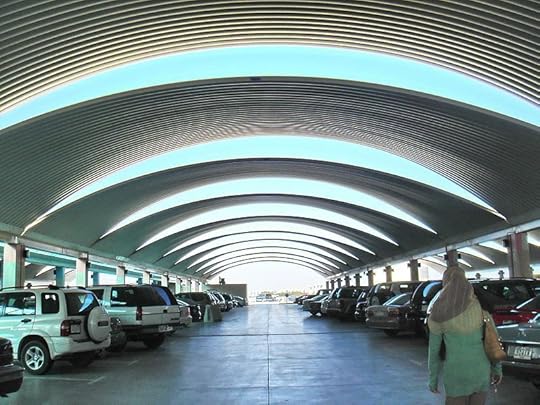
Glorious Parking (photo by Faris Ali)
Why the IRS Awards Driving Over Transit for 2012
By Ozzie Zehner
Starting on January 1, 2012, the IRS will reduce the allowable pre-tax contributions to transit riders while increasing benefits for drivers – an economic tax subsidy that will end up supporting car culture with twice the gusto of transit.
The IRS announced the following limits for pre-tax contributions and reimbursements on 2012 Commuter Benefits Accounts:
Transit pre-tax contributions: Decreased from $230 to $125 per month
Parking pre-tax contributions: Increased from $230 to $240 per month
History: The American Recovery and Reinvestment Act of 2009 (ARRA) increased the monthly pre-tax reimbursement limit for Commuter Benefit Transit accounts temporarily from $120 to $230. That limit expires on December 31, 2011.
Status: Congress has not acted to extend the current deadline. Unless they take action by January 1, 2012, the monthly pre-tax contribution and reimbursement limits for transit accounts will drop to $125, roughly half the limit for drivers.
Shameless Plug: Read about hidden car culture subsidies in my upcoming book: GreenIllusions.org


 [image error]
[image error]




October 25, 2011
The 7 Biggest Economic Myths
Robert Reich here at UC Berkeley recently spoke at Occupy SF and it got me to wondering what he's up to these days. Here's the answer. This is a video of some economic myths he's identified and turned into a 3-minute film.
Journalist Sam Smith commented on the MoveOn.org-produced video – "Demagogues through history have known that big lies, repeated often enough, start being believed unless they're rebutted. These seven economic whoppers are just plain wrong. Make sure you know the truth – and spread it on."
So, I guess I'm taking his lead. But as always, I'm interested in critiques of these talking points as well. I've included the transcript:
1. Tax cuts for the rich trickle down to everyone else. Baloney. Ronald Reagan and George W. Bush both sliced taxes on the rich and what happened? Most Americans' wages (measured by the real median wage) began flattening under Reagan and have dropped since George W. Bush. Trickle-down economics is a cruel joke.
2. Higher taxes on the rich would hurt the economy and slow job growth. False. From the end of World War II until 1981, the richest Americans faced a top marginal tax rate of 70 percent or above. Under Dwight Eisenhower it was 91 percent. Even after all deductions and credits, the top taxes on the very rich were far higher than they've been since. Yet the economy grew faster during those years than it has since. (Don't believe small businesses would be hurt by a higher marginal tax; fewer than 2 percent of small business owners are in the highest tax bracket.)
3. Shrinking government generates more jobs. Wrong again. It means fewer government workers – everyone from teachers, fire fighters, police officers, and social workers at the state and local levels to safety inspectors and military personnel at the federal. And fewer government contractors, who would employ fewer private-sector workers. According to Moody's economist Mark Zandi (a campaign advisor to John McCain), the $61 billion in spending cuts proposed by the House GOP will cost the economy 700,000 jobs this year and next.
4. Cutting the budget deficit now is more important than boosting the economy. Untrue. With so many Americans out of work, budget cuts now will shrink the economy. They'll increase unemployment and reduce tax revenues. That will worsen the ratio of the debt to the total economy. The first priority must be getting jobs and growth back by boosting the economy. Only then, when jobs and growth are returning vigorously, should we turn to cutting the deficit.
5. Medicare and Medicaid are the major drivers of budget deficits. Wrong. Medicare and Medicaid spending is rising quickly, to be sure. But that's because the nation's health-care costs are rising so fast. One of the best ways of slowing these costs is to use Medicare and Medicaid's bargaining power over drug companies and hospitals to reduce costs, and to move from a fee-for-service system to a fee-for-healthy outcomes system. And since Medicare has far lower administrative costs than private health insurers, we should make Medicare available to everyone.
6. Social Security is a Ponzi scheme. Don't believe it. Social Security is solvent for the next 26 years. It could be solvent for the next century if we raised the ceiling on income subject to the Social Security payroll tax. That ceiling is now $106,800.
7. It's unfair that lower-income Americans don't pay income tax. Wrong. There's nothing unfair about it. Lower-income Americans pay out a larger share of their paychecks in payroll taxes, sales taxes, user fees, and tolls than everyone else.
See images from my upcoming book at GreenIllusions.org
[image error]


 [image error]
[image error]



October 14, 2011
GM Raises its Middle Finger to Bicycling
As if being forced to bail out General Motors was not enough of a slap in the face to walkers and bikers, the company is now flipping them off.
A 2012 GM marketing campaign attempts to stigmatize those atop two wheels. The company's "reality sucks" campaign portrays an embarrassed college kid pulling up by bike next to an attractive model who's being chauffeured by car. The byline reads, "Stop pedaling…start driving." Besides being sexist and classist (but not, apparently, racist), according to critics, the ad's greatest offense may actually be far less divisive.
It's unrealistic.
Leave it to GM to be out of touch with their market. As anyone outside the Detroit void would know, you're far more likely to find students boycotting car culture than scoffing at bicyclists on today's college campuses. Nevertheless there remains a hitch.
Many students aren't able to walk or bike to class even if they want to do so. Sprawling suburban campuses, inadequate infrastructure, and unsafe conditions force many students to arrive to those boycotts by car. And we might think that this situation, in itself, is no particular fault of General Motors…if we knew nothing of history.
The General has long carried the hands of policymakers in its pockets and has always obliged when asked to help out with the nation's transportation policy matters. Even today, from Michigan's car-friendly conservative governor to Michigan's car-friendly liberal senator, it's presence emanates local and national politics. What's good for country is good for the General, and vice versa. Especially if that goodness is measured in billions.

In this ad from a few years ago, public transit was the target of General Motors' advertising agency
Obama is already praising the bailout as a success. But by what measure? Is it a success because it has delayed the inevitable? Is it a success for sidestepping alternate plans that might have addressed bicycle infrastructure, walkability, or public transit?
Measuring any bailout as a success, as we are now painfully learning, is not simply a measurement of success itself, but a measurement of the yardstick being used. And in the end, whether it's a matter of subsidizing car culture or stigmatizing bicyclists, we may very well find that those technocratic success stories can cut both ways.
– Ozzie Zehner is a visiting scholar at the University of California, Berkeley and the author of Green Illusions, which discusses suburbia, biking, and GM.
 [image error]
[image error]






October 11, 2011
"Self-destruction is the Power Without Knowing What the Function Is"
The above quote from the rapper Immortal Technique found its way into the Occupy Wall Street protests this morning and into a piece on Democracy Now. The Democracy Now segment included the full rap as well as an interview with Justin Wedes, an organizer with Occupy Wall Street who said, "The reaction has been—and I think the whole world sees it now—that every time that you try to silence peaceful protests, you just get an explosion of new support. And I think that's what's happened. And it really bares sort of naked the truth about who the NYPD serve and protect. And if that's not the people… then we have a problem."
He goes on to talk about the NYPD's Paid Detail Unit, which is a unit hired as private security for the New York Stock Exchange, and the bank JPMorgan Chase, which has given the largest single contribution to the New York Police Foundation they've ever received, reportedly $4.6 million.
"What we've seen happen in the past few weeks on Wall Street with the over-barricading, the over-policing, streetcart vendors have been pushed out of that street. They're losing business like crazy, so we've started to partner with them to source our food and our supplies." remarked Wedes. "It brings up the question of who is being protected now. 'Who are we protecting, NYPD?' We're not protecting the streetcart vendors. We're not protecting the local small businesses. You know, is it just the bankers? Is it just the hedge funders and the financial firms? Or does the NYPD have a responsibility, because they're our—they're our NYPD—to serve and protect the entire city?"
I've just posted images from my upcoming book at GreenIllusions.org








October 7, 2011
Eco Porn: Revenge of the Electric Car
"Environmentalists generally object to battery-powered devices and for good reason: batteries require mined minerals, employ manufacturing processes that leak toxins into local ecosystems and leave behind an even-worse trail of side effects upon disposal. Though when it comes to the largest mass-produced batterypowered gadget ever created—the electric car—environmentalists cannot jump from their seats fast enough to applaud it."
–Ozzie Zehner (as quoted in The Economist)
See images from my upcoming book at GreenIllusions.org


 [image error]
[image error]




October 6, 2011
George Will Points to Elizabeth Warren's Straw-Man By Erecting His Own Scarecrow

[Liberalism's] premise is that individualism is a chimera, that any individual's achievements should be considered entirely derivative from society, so the achievements need not be treated as belonging to the individual…Liberalism preaches confident social engineering by the regulatory state. Read more.
See images from my upcoming book at GreenIllusions.org








October 4, 2011
New: Dutch Cycling Embassy Video
The Dutch Cycling Embassy, a coalition of bike ambassadors from, private companies, non-profits, bike manufacturers and government entities, released this new video on the perhaps surprising history of Dutch cycling. (Well, surprising for those who did not read my recent post on the history of Dutch bicycle infrastructure.) The video is by Marc van Woudenberg.








October 3, 2011
Do We Treat Our Cars Better Than We Treat Ourselves?
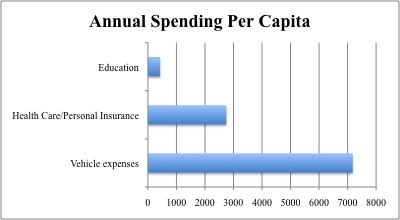
US Bureau of Labor Statistics
Streetblog's Anne Lutz Fernandez added up some recent numbers to ponder:
The average American spends nearly as many dollars annually on the well-being of each vehicle—$2,536 for repairs, maintenance, and insurance—as on each member of the family, whose allocation for healthcare and insurance is $2,747.
13 percent of a home's value is accounted for by its garage. (Again, think about tax and insurance implications.)
The average American adult spends 18.5 hours per week on the road, much of this driving solo, compared to the 6.7 hours per week spent preparing meals and caring for children and only 2.2 hours per week exercising.
Read the full article here.








September 28, 2011
A Wise Quote from Prof. Wangari Maathai

"You cannot protect the environment unless you empower people, you inform them, and you help them understand that these resources are their own, that they must protect them."











